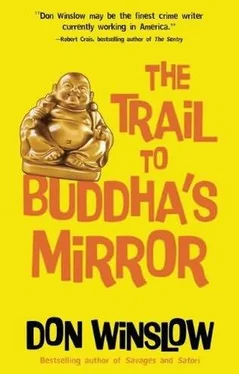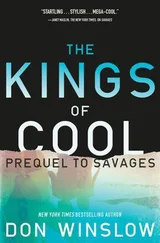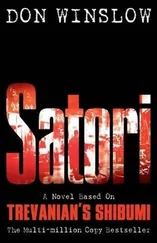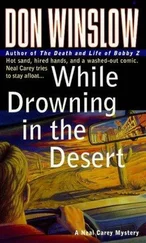Don Winslow - The Trail to Buddha_s Mirror
Здесь есть возможность читать онлайн «Don Winslow - The Trail to Buddha_s Mirror» весь текст электронной книги совершенно бесплатно (целиком полную версию без сокращений). В некоторых случаях можно слушать аудио, скачать через торрент в формате fb2 и присутствует краткое содержание. Жанр: Триллер, на английском языке. Описание произведения, (предисловие) а так же отзывы посетителей доступны на портале библиотеки ЛибКат.
- Название:The Trail to Buddha_s Mirror
- Автор:
- Жанр:
- Год:неизвестен
- ISBN:нет данных
- Рейтинг книги:3 / 5. Голосов: 1
-
Избранное:Добавить в избранное
- Отзывы:
-
Ваша оценка:
- 60
- 1
- 2
- 3
- 4
- 5
The Trail to Buddha_s Mirror: краткое содержание, описание и аннотация
Предлагаем к чтению аннотацию, описание, краткое содержание или предисловие (зависит от того, что написал сам автор книги «The Trail to Buddha_s Mirror»). Если вы не нашли необходимую информацию о книге — напишите в комментариях, мы постараемся отыскать её.
The Trail to Buddha_s Mirror — читать онлайн бесплатно полную книгу (весь текст) целиком
Ниже представлен текст книги, разбитый по страницам. Система сохранения места последней прочитанной страницы, позволяет с удобством читать онлайн бесплатно книгу «The Trail to Buddha_s Mirror», без необходимости каждый раз заново искать на чём Вы остановились. Поставьте закладку, и сможете в любой момент перейти на страницу, на которой закончили чтение.
Интервал:
Закладка:
He started with the usual suspects-Standard and Poor’s, Moody’s, Dun amp; Bradstreet-and found out that AgriTech was a much smaller company than he thought it would be, a lowly sixteenth ranking in the agrichemical category.
The bigger surprise, though, was that it was privately held. That didn’t make sense. Companies engaging in large, long-term research projects usually need the capital they can get on the public market. They’re attractive investments, and the initial investors usually like to roll them over early.
But private firms are just that-private. Harder to get data on, less responsible to watchdog agencies. Neal found a copy of Ward’s Directory, which specialized in private companies. He found out that AgriTech employed 317 people-not many for a research company-and had a narrow market base, mostly in the development of pesticides for the tobacco industry.
Pesticides? Neal thought. What happened to fertilizer? To the old chickenshit?
He took a look at the directors and principal officers. The president was one Leslie P. Little, Ph. D. Chemistry degrees from Nebraska, Illinois, and MIT. Impressive resume of employment at several large agrichemical firms. Vice-President Harold D. Innes very similar. Dull stuff. But Secretary/Treasurer Paul R. Knox-even the title was an anomaly-was a little more interesting. Pretty standard management education, including a Columbia M.B.A. and a long list of prior employment-but it looked fuzzy, out of focus. Knox had worked for Trans Pax, an import-export firm in San Diego, before moving to something called the Council for Swedish-American Trade. He had stayed there for two years and then taken a position in Stockholm with Sverigenet, an American computer consulting firm. After three years at Internet he had split for Hong Kong as executive director of a telecommunications equipment importer called Dawson and Sons, Ltd. Two years there, and he’d left for Directions in Social Inquiry, apparently a polling operation, in Silver Springs, Maryland. Then on to the board of AgriTech, where he was also the comptroller.
By the record, Neal thought, this guy knows less about chemicals than any junior high school student on the West Side.
Neal scanned the board of directors. None of the names meant anything to him until he came to the fourth entry: Ethan Kitteredge, the Man himself. So the Bank had come across with the big loan and bought itself a seat on the board. But for what?
Follow the money. Or, in this case, the money man. Somewhere along the line, Ethan Kitteredge had handed a packet of bucks to Paul Knox, who had a pinball background.
Neal went across the street, grabbed a quick cup of coffee and a toasted bagel, and headed back into the library. It was already noon, and he would have to repeat the process he had used in AgriTech with all of Knox’s former companies. He figured it would take him at least another three hours. It didn’t; none of the companies existed.
He looked in every source that he knew, but couldn’t find any entry for Trans Pax, Internet International, or Directions in Social Inquiry. Dawson and Sons wouldn’t have been listed anyway, but Neal suspected it was another cardboard company.
So how about the Council for Swedish-American Trade? Was it a nonprofit agency to stimulate business, a government-sponsored agency, or a private concern that put itself in the middle of any potential deal and took its ten points?
Neal found the Washington, D.C., phone book on microfilm, but couldn’t find any listing for the Council. Ditto when he called information. He got the number for the Department of Commerce, and a half-dozen transfers and holds got him to somebody at the International Trade Administration’s Export Counseling Center who at least pretended to be interested in Neal’s brilliant plan to market high-efficiency electric space heaters to the Swedish consumer. This helpful person forwarded Neal’s call to the Administration’s desk officer for Sweden, who politely feigned fascination and advised Neal to contact the Swedish consulate, board of trade, and interior affairs bureau, but who never mentioned the Council for Swedish-American Trade.
“What about the Council for Swedish-American Trade?” Neal asked finally.
He could almost hear the chuckle that preceded the answer, “They’re not really in your field.”
“How come?”
“They tend to handle more high-tech, larger-volume sorts of things.”
“I’m planning real high volume,” Neal said with a trace of belligerence.
“And when you get there, I’m sure they’ll be glad to talk to you. In the meantime, I really recommend you give the consulate a call…”
Okay, okay, Neal thought. What do we have here? A guy on the board of an agrichemical company who has no background or education in agriculture or chemistry. The same guy has worked for a bunch of companies that can’t be traced and for a council on Swedish-American trade that isn’t interested in talking to someone about trade between America and Sweden.
We have a company that should be public that’s private-a company that makes pesticides and is desperate to get back a biochemist whose specialty is fertilizer. We have the Bank writing a big loan to this company to develop not a new pesticide, but a new fertilizer, and then taking a seat on the board of the company. And we have the Man at the Bank sending me to get the scientist back. Then someone tries to shoot me when I do.
We have Levine lying about Pendleton’s return, and AgriTech security backing up the lie. We have Levine telling me to come home and forget about it. Why would they say Pendleton’s back when he isn’t? Why isn’t Levine jumping up and down and screaming at me to do my fucking job and bring him back?
Unless all of a sudden they don’t want him back.
Unless they want to make sure he doesn’t come back.
Ever.
Paranoia is like a seatbelt-it’s when you don’t put it on that you get in an accident.
So thought Neal Carey as professional paranoia gripped him around the middle. Graham would never let anything happen to me while he’s on the job, so they take him off. They make a big show out of sending their golden boy retriever, me, to find the absent professor. Good old dog that I am, I go on point, and someone shoots… not me, but what they think is Pendleton. Dark night, dimly lit deck, the back of my head to the hill, where the shot came from. It’s possible.
So someone goes out and picks up my poor corpse and makes the sad announcement that Robert Pendleton is dead. Murdered. The investigation fizzles and is forgotten.
But who has the swag to carry that kind of load? The same people who have the swag to set up dummy companies, phony histories, and multimillion-dollar insider loans.
He reran his conversation with Pendleton in his head. Meeting in a hot tub to make sure he wasn’t wired. “So did the company send you?” No, idiot, not the company, but the Company. The Company.
Paranoia. Pure fucking paranoia, Neal thought. The CIA? What would a dorky biochemist be doing for the CIA? Get real.
But the bullet was real. Very real, so pay attention here. Suppose they did try to whack Pendleton? That presents some problems for one Neal Carey. If they still think they killed Pendleton, they have to deal with me somehow. And if they know by now that they missed Pendleton, they’ll be looking for both of us. They’ll know where to look for Pendleton. He’s with Li Lan.
And they sure as hell know where to find me, don’t they? I have a return ticket to my isolated cottage in the moors.
Except I’m not going to be there. There’s only one thing to do when paranoia hits this bad-run with it.
First he had to get to Crowe, because Friends and their new CIA buddies could connect Crowe to him with a quick cross-referencing of the files just by pushing a couple of buttons and asking for Neal Carey cases in San Francisco. So he had unwittingly put the artist in some danger.
Читать дальшеИнтервал:
Закладка:
Похожие книги на «The Trail to Buddha_s Mirror»
Представляем Вашему вниманию похожие книги на «The Trail to Buddha_s Mirror» списком для выбора. Мы отобрали схожую по названию и смыслу литературу в надежде предоставить читателям больше вариантов отыскать новые, интересные, ещё непрочитанные произведения.
Обсуждение, отзывы о книге «The Trail to Buddha_s Mirror» и просто собственные мнения читателей. Оставьте ваши комментарии, напишите, что Вы думаете о произведении, его смысле или главных героях. Укажите что конкретно понравилось, а что нет, и почему Вы так считаете.












